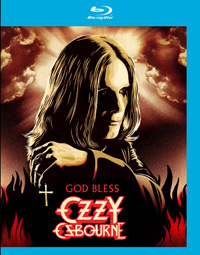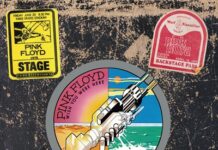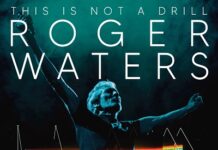God Bless Ozzy Osbourne is a highly personal, brutally honest documentary about the infamous singer. Jack Osbourne, the Ozman’s youngest son, co-produced and obviously had a hand in access and the direction of the piece, some of which is old hat and most of which is marvelous detail and unparalleled exposure. It certainly makes for some dramatic situations and fascinating moments — the essentials for a decent rockumentary these days.
The film seamlessly flows back and forth from present day Ozzy — in the dressing room, at soundchecks, doing cardio and vocal exercises, plotting the set list with then-guitarist Zakk Wylde and celebrating his 60th birthday in Las Vegas with friends and family — to the man’s colorful history. Throughout, there’s this firsthand experience of the singer’s daily regimen of touring, talking on the phone, hanging at the hotel, flying to gigs, attending events, signing autographs, meeting fans, going to bed and reminiscing.
Everyone from Metallica’s bassist Robert Trujillo to Paul McCartney talks about the Black Sabbath phenomenon. Bandmates Bill Ward, Geezer Butler and Tony Iommi, as well as Sharon Osbourne, all weigh in on the band’s early success and eventual excess. Along the way, we hear from family members – brothers, sisters, Osbourne’s daughter and son from his first marriage. Nothing is held back, including stories about the mayhem from alcohol and drugs.
Osbourne’s solo career and the steady build of a pop culture icon are well laid out. The years with Randy Rhoads, featuring grainy footage (there are better prints available) from an After Hours in-studio performance featuring the Osbourne’s first band, was a highpoint in the singer’s career. Sharon Osbourne spells it out clearly: “In less than a year after being fired from Black Sabbath, Ozzy was a rock star again.”
But even as his star took off, the so-called Prince of Darkness dealt with a multitude of personal issues, stemming mostly from booze and dope. Adding to his fragile mental state was the tragic death of Rhoads, a blow Osbourne never got over. Bassist Rudy Sarzo, who wrote a fantastic book about his time with Rhoads and Osbourne, talks about the day the guitarist died, and emotionally recalls seeing Ozzy at the same church he was drawn to in the aftermath.
At this point, the focus shifts away from the music (aside from a brilliant bit of Ozzy watching his old 80s videos) and over to the family and the ensuing celebrity they all experienced from their reality show, a story all its own. Well, that and biting off the heads of doves and bats and stirring up religious fanatics. At the root of it was substance abuse, in all its forms. Tommy Lee’s stories about Ozzy are so out there, you have to see the film to believe it.
Where 1991’s Don’t Blame Me, the first official Ozzy Osbourne documentary, painted a much rosier picture through the end of the 80s, God Bless Ozzy Osbourne picks up the slack. The singer continued to have drug and alcohol problems in the 90s and 00s, but he eventually emerged from the haze and got sober. At one point, Ozzy and Sharon revisit Osbourne’s child home. “It’s so small,” Ozzy says as they pull into the neighborhood. It’s a side of a kinder and gentler Ozzy Osbourne. Now, instead of urinating at the Alamo, the madman indulges himself in things like drawing and driving his car around the neighborhood.
God Bless Ozzy Osbourne, which had a limited theatrical run in September 2011, gets an extra shot of bonus material on the DVD and Blu-ray Disc. Lots of insightful deleted scenes (like a glimpse of the Osbournes’ hide-a-TV-under-the-bed excess) and a Q&A with Ozzy and Jack bring more to the surface. But even without the dressing, God Bless Ozzy Osbourne perfectly captures the essence of one of rock’s most charismatic and remarkable figures.
~ Shawn Perry




















